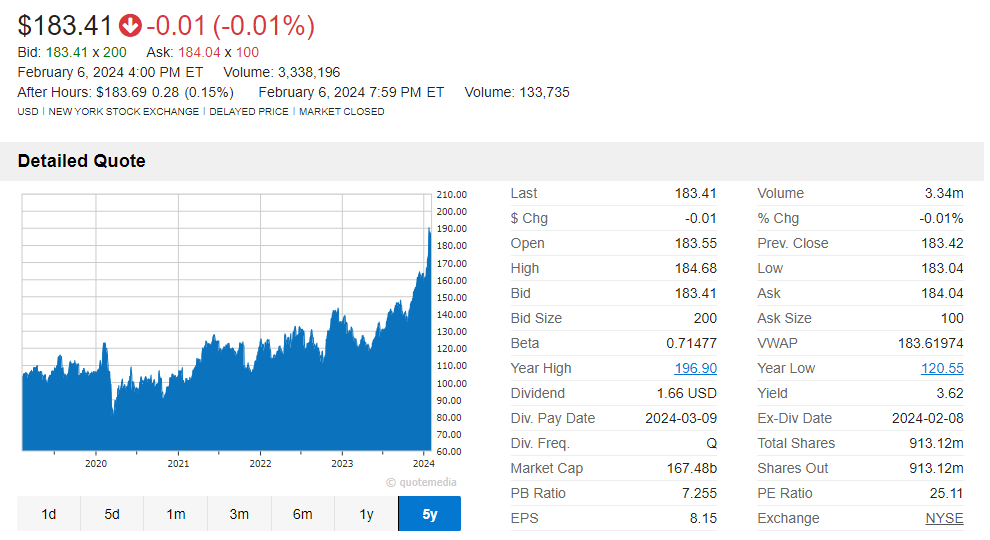IBM (NYSE:IBM) stock has been on a tear recently. Over the last year, IBM’s stock price has risen from around $135 to $183 – a gain of approximately 36%. Is it time to sell the stock? Or should investors hold on for further gains? Let’s discuss.
IBM is an AI play
IBM is having a lot of success in the artificial intelligence (AI) space right now and this is helping to push revenues higher.
In January, the technology giant advised that orders from its generative AI business – which includes bookings and sales from services such as those powered by its ‘watsonx’ AI platform – doubled in the fourth quarter of 2023 relative to the third quarter.
This strong growth from AI is expected to lead to overall revenue growth of around 4-6% in 2024 (a higher level of growth than Wall Street analysts were expecting going into the Q4 earnings). The company also expects to generate around $12 billion in free cash flow in 2024.
“In the fourth quarter, we grew revenue in all of our segments, driven by continued adoption of our hybrid cloud and AI offerings. Client demand for AI is accelerating,” commented IBM Chairman and CEO Arvind Krishna in the company’s Q4 results.
Is IBM a sell or a hold?
So clearly, the company has momentum at present thanks to AI. The stock’s valuation remains undemanding, however. With Wall Street analysts expecting earnings per share (EPS) of $10.10 for 2024, the forward-looking price-to-earnings (P/E) ratio is just 18. That multiple is a lot lower than the multiples on some other tech stocks such as Apple and Amazon.
Meanwhile, with the company’s market cap sitting at $168 billion, the forward-looking free cash flow yield is around seven. That’s attractive.
These valuation multiples, and the current dividend yield of around 3.7%, suggest that IBM stock is not overvalued right now.
Therefore, it could be worth holding on to the shares.

What will the IBM stock price be in 2025?
It’s worth noting that after IBM’s recent Q4 results, several brokers raised their 12-month share price targets for the stock.
One such broker was Jefferies, which has a ‘hold’ rating on the stock. It raised its price target to $215, citing the free cash flow story.
Another was BMO Capital Markets, which has an ‘market perform’ rating on IBM. It lifted its price target to $210.
These price targets suggest that analysts believe the stock can rise to a higher level in 2025.
Is IBM a safe stock to buy?
Is IBM a safe investment? Well, all stocks have their risks.
In this case, competition from rivals is a key risk. IBM is up against some formidable players including Microsoft, Amazon, Google, Oracle, Hewlett Packard Enterprise, and Accenture. All of these companies could potentially steal market share from the company.
Another risk is an economic slowdown. This could hit enterprise spending. In IBM’s Q4 results, CFO James Kavanaugh noted that the company continues to operate in a “very volatile and uncertain” economic environment, so this is an issue to monitor.
Overall though, I don’t see the tech stock as particularly risky. The valuation isn’t stretched and with the dividend yield at nearly 4%, there are two potential sources of return here.

Based in London, Edward is a distinguished investment writer with an extensive client portfolio comprising a diverse array of prominent financial services firms across the globe. With over 15 years of hands-on experience in private wealth management and institutional asset management, both in the UK and Australia, he possesses a profound understanding of the finance industry.
Before establishing himself as a writer, Edward earned a Commerce degree from the prestigious University of Melbourne. Complementing his academic background, he holds the esteemed Investment Management Certificate (IMC) and is a proud holder of the Chartered Financial Analyst (CFA) qualification.
Widely recognized as a sought-after investment expert, Edward’s insightful perspectives and analyses have been featured on sites such as BlackRock, Credit Suisse, WisdomTree, Motley Fool, eToro, and CMC Markets, among others.
To contact Ed, please ask a question in our financial discussion forum.



